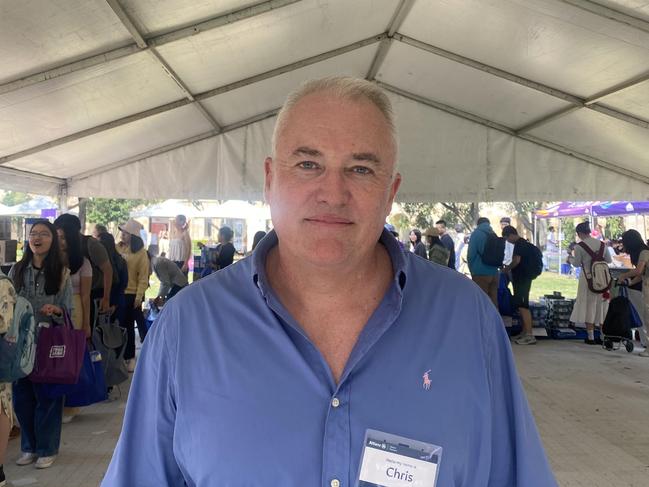Hundreds of students desperate for food at University of Qld’s Food Relief Market
In two hours, 700 Brisbane-based students exposed a new and terrifying crisis unfolding inside the grounds of Australia’s biggest and most prestigious universities.
Education
Don't miss out on the headlines from Education. Followed categories will be added to My News.
International university students are in crisis as cost of living surges, with many saying accessing basic food was difficult and stressful.
The criss was laid bare at the University of Queensland this week when more than 700 international students queued for the Food Relief Market, run by Foodbank and Allianz Partners.
In just two hours, 10 tonnes of food including fresh fruit, vegetables, pasta, rice and frozen ready-made meals, had run out.
It comes after Foodbank research showed more than a third of international students studying in Australia couldn’t afford to eat fresh, healthy food amid rising living costs and inflation.
Foodbank Queensland CEO Jess Watkinson said the turn out highlighted the sheer desperation of students who could no longer afford food, specifically fresh fruit and vegetables.
“We saw a significant increase in food insecurity during Covid and it has not reduced since then,” she said.


“This today, is a short term solution and what we really need to address is food insecurity as a whole in Queensland and in Australia,” she said.
Ms Watkinson said international students particularly struggled because of restrictions on how often they could work.
“So that can impact their capacity to earn and with cost of living rising into rental housing, if you have to pay rent, that’s the first thing you’re going to pay,” she said.
“Then what’s left over, might go to food, and that could be very small.”
International student Xiao Zhang from China said food was “way more” expensive in Queensland compared to her home country.
“It is very different,” she said.
Friend Yexian Yang described food prices in Queensland as “really expensive” and said the market had “helped a lot”.
“I can eat this for at least three days,” she said.
UQ Students from Norway Sunniva Burgas and Kamilla Eggen had both saved ahead of coming to Australia with food prices in mind.
“We are lucky to have that support at home in case we run out of money but we are definitely burning through it,” Ms Burgas said.
Ms Burgas said they were unable to work to support themselves while here which made it difficult to get food.
“It is stressful,” she said.
Student from India, Pankaj said food was over double the price of food back home.
“We cannot go outside to eat food but if we cook we can [get by],” he said.

Allianz Partners CEO Chris McHugh said 36 per cent of international students couldn’t afford for fruit and vegetables.
“Food insecurity is something that is not well understood, not well known, and not well promoted. And there is a stigma that’s associated with going and getting support,” he said.
“…Cost of living is a critical issue. I know, I’m a CEO and I can assure you that I think about the dollar. I couldn’t imagine being an international student and trying to make do,” he said.
A University of Queensland spokeswoman said the university recognised many people were facing challenges due to the increased cost of living.
“We are continuing to work with student groups and community providers on how to best support our students,” she said.
“During Student Health Week, we have been raising awareness of services available to support student health and wellbeing and how to access assistance.
“Assistance options range from financial support for those experiencing temporary or unexpected financial hardship to UQ Union programs such as Kampus Kitchen and Morning Marmalade that provide food for students on our campuses.”


